Curating a Workshop of Nature for Kids
Posted on 06/06/2025
Curating a Workshop of Nature for Kids: A Comprehensive Guide
Children are natural explorers, constantly fueled by curiosity and an inborn wonder for the world around them. In today's modern society, however, many kids are detached from nature--glued to screens and detached from the wonders that flourish right outside their doors. Curating a workshop of nature for kids is an effective, engaging, and fun way to foster a lifelong love for the environment, instilling essential knowledge, values, and life skills.
In this article, we'll share everything you need to know about developing, planning, and running an enriching nature workshop for children, including activity ideas, logistical tips, and the huge developmental benefits it offers. Whether you're a teacher, parent, community organizer, or nature enthusiast, this guide will help you plan an unforgettable outdoor learning experience!

Why Create a Nature Workshop for Kids?
Before diving into the how-to, let's address the why. Numerous studies have shown that time spent in nature positively affects children's physical, mental, and emotional well-being. Curating nature-based workshops for children offers benefits such as:
- Enhanced Cognitive Skills: Nature play boosts concentration, creativity, problem-solving, and critical thinking.
- Physical Development: Outdoor activities improve coordination, balance, and overall health.
- Emotional Growth: Nature reduces stress and anxiety, promoting happiness and mindfulness.
- Social Skills: Group-based nature workshops encourage teamwork, empathy, and cooperation.
- Environmental Awareness: Kids develop respect, care, and understanding for the environment.
With such clear advantages, it's no surprise that the concept of 'curating a workshop of nature for kids' is growing in popularity worldwide.
Essential Elements of a Nature Workshop For Children
For your workshop to be successful, certain elements must be thoughtfully included to balance fun and learning. Here are the essential components to consider while organizing a nature workshop for kids:
1. Choosing the Right Location
The perfect setting is crucial. It could be a local park, nature reserve, forest, botanical garden, or even a well-equipped backyard. Ensure the location is:
- Safe and accessible for all participants
- Rich in biodiversity (plants, insects, birds, etc.)
- Free from obvious hazards (e.g., toxic plants, steep drops)
- Spacious enough for group activities
- Familiar or close to the community (to foster a local connection)
2. Age-Appropriate Activities
Design your nature-based workshop for kids with activities tailored to their age and skill levels:
- Under 5: Simple sensory games, nature walks, collecting leaves and pebbles, water play.
- 6-10: Bug hunts, bird watching, scavenger hunts, simple experiments (e.g., seed sprouting).
- 11+: Orienteering, tree identification, nature journaling, conservation projects, building birdhouses.
3. Interactive Learning
The best nature workshops are hands-on and interactive. Encourage kids to touch, observe, ask questions, and make discoveries. Use tools like:
- Magnifying glasses
- Field guides and picture cards
- Clipboards and notebooks
- Safe digging tools
4. Creative Expression
Creative tasks help kids connect emotionally to the environment. Integrate activities that encourage artistic expression, such as:
- Pressed flower art
- Nature weaving (using twigs, leaves, and grasses)
- Leaf rubbings and bark imprints
- Storytelling and poetry sessions inspired by surroundings
5. Reflection & Sharing
Set time aside for kids to share their experiences, findings, and creations with the group. This not only reinforces learning but also builds communication skills and self-confidence.
Planning Your Workshop: Step-by-Step
Curating a successful workshop of nature for children involves careful planning and attention to detail. Follow this step-by-step checklist:
1. Set Your Objectives
What do you want the kids to learn and experience? Do you aim to teach them about local ecosystems, species identification, conservation, or simply to enjoy outdoor play? Defining clear goals will shape your entire workshop structure.
2. Assemble a Team
If possible, recruit fellow parents, teachers, or local experts (such as park rangers or horticulturists) to assist. More adults mean greater support, safety, and expertise for the children.
3. Prepare Materials and Resources
Depending on your chosen activities, gather necessary supplies:
- Basic first-aid kit and emergency contact forms
- Field guides, educational posters, and activity sheets
- Drawing and craft materials
- Snacks and hydration
- Protective gear (hats, sunscreen, insect repellent)
4. Design a Flexible Schedule
Nature is unpredictable, so build in flexibility for weather and kids' interests. A sample schedule for a half-day workshop might include:
- Welcome circle & introduction
- Guided nature walk or exploration
- Break & snack time
- Hands-on activity session (such as bug hunting or bark rubbing)
- Creative project or group game
- Reflection & sharing circle
5. Safety and Supervision
Safety comes first, always. Conduct a pre-workshop risk assessment of the site, check for allergies or special needs among participants, and ensure all adults understand supervision roles.
6. Communicate With Parents
Send a checklist of required clothing (layers, sturdy shoes, rain gear if needed), permissions, and emergency contacts. Create excitement by sharing the goals and planned adventures in advance!
Engaging Activities for a Nature Workshop
The heart of any curated workshop of nature for kids is its activities. Here are some tried-and-tested favorites, sure to engage and inspire:
1. Nature Scavenger Hunt
Create a checklist of common natural items: pinecone, feather, smooth stone, yellow leaf, ant, and so on. Children search in teams, observing closely and learning to identify features. Add riddles or sensory challenges for extra fun!
2. Bug & Insect Safaris
Equip children with magnifying glasses and containers (with air holes). Guide them in gently searching for insects, identifying their features, and releasing them safely. Discuss each insect's role in the ecosystem.
3. Tree and Plant Exploration
Help kids recognize local trees and plants by their leaves, bark, and flowers. Try bark rubbing or leaf matching games. For older children, introduce basic botany concepts or seed dispersal experiments.
4. Sensory Nature Walks
Encourage children to explore with their senses: listen for bird calls, feel textures of leaves and soil, smell flowers, and observe colors in the landscape. Include a moment of quiet "sit spotting" to notice small details.
5. Nature Art and Craft
Gather fallen leaves, twigs, and petals for creative projects--collages, mobiles, or natural paintbrushes. Natural art encourages imaginative thinking and fine motor skills.
6. Journaling and Nature Stories
Give each child a notebook to draw or write about their discoveries. Group storytelling sessions, where everyone adds a line inspired by the day, weave shared memories and laughter.
Tips for Success: Making Your Nature Workshop Unforgettable
- Be adaptable and follow the children's interests. The most meaningful experiences often emerge from spontaneous discoveries.
- Model curiosity and respect for nature. Kids learn as much from your attitude as they do from formal teaching.
- Take lots of photos (with permission) to share memories.
- Offer follow-up resources: book recommendations, home activities, or invitations to future workshops.
- Invite guest speakers, such as local naturalists or conservationists, for special sessions.
Addressing Common Challenges When Curating a Workshop of Nature for Kids
1. Weather Woes
Always have a backup plan. A sheltered area (like a pavilion) and rain-appropriate activities (pond-dipping, weather observations) ensure the workshop continues come rain or shine.
2. Diverse Interests and Abilities
Offer activity stations or "choice times" so kids can select what engages them most. Pair younger and older children for buddy support, and differentiate tasks to match skills and confidence levels.
3. Environmental Impact
Teach and model Leave No Trace principles. Guide children to respect wildlife, avoid picking living plants, and clean up after themselves.

The Lasting Impact: Why Curating a Workshop of Nature for Kids Matters
Organizing a nature workshop for children is far more than a fun outing. It's an investment in the next generation's health, happiness, and sustainability mindset. Participants learn:
- Resilience and adaptability through real-world problem-solving
- Gratitude for natural resources and how to protect them
- Science concepts embedded in hands-on experiences
- Social and emotional skills cultivated through teamwork and mindfulness
As children grow up facing environmental challenges, the seeds planted in a well-curated workshop of nature can blossom into informed stewardship and a deep, enduring love for our planet.
Conclusion: Start Curating Your Nature Workshop Today!
Whether you run a one-hour backyard adventure or a week-long forest camp, curating a workshop of nature for kids is a joyful, meaningful way to inspire, educate, and connect children to the world around them. The benefits last a lifetime--empowering young people to explore thoughtfully, cherish their environment, and embrace a lifetime of learning in nature's grand classroom.
Ready to get started?
- Gather your resources and allies.
- Choose a safe, stimulating natural location.
- Design a flexible, engaging schedule.
- Invite the kids--and let the adventures begin!
Curating a workshop of nature for kids is not just about teaching facts; it's about sparking wonder, encouraging discovery, and nurturing future environmental champions--one muddy hand, one curious question, and one joyful laugh at a time.
Latest Posts
Building a Magical Garden Adventure for Children
How Sustainable Gardening Helps Fight Climate Change
Design a Tranquil Outdoor Haven with 5 Low Maintenance, Budget Ideas
The Symphony of Hedge Trimming: Dive into Shapes and Techniques

